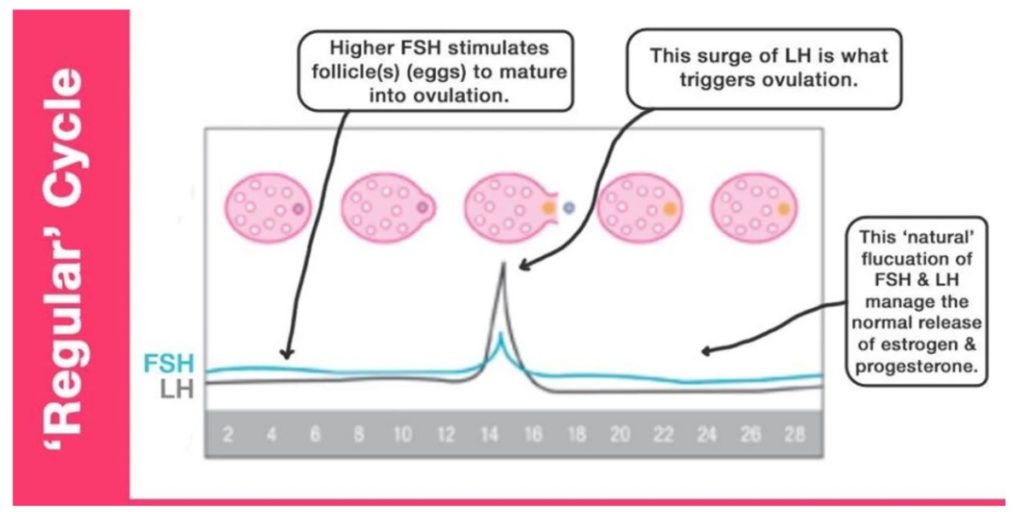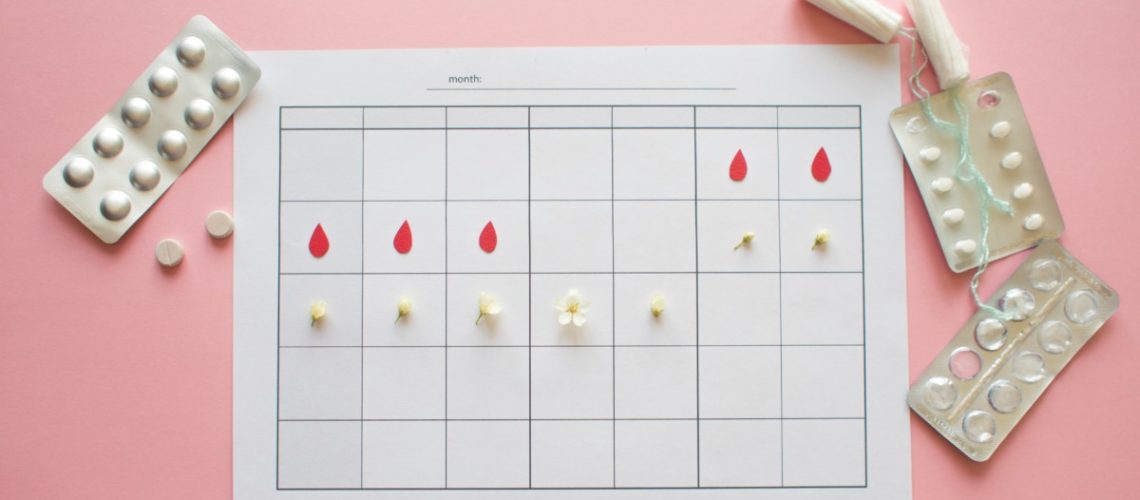Many of us start paying attention to the regularity of our periods (or lack there of) when we want to try for a baby. But did you ever wonder why you should pay attention to your cycle and your periods even if you don’t want kids now (or ever)? Why suppressing the menstrual cycle and its associated hormones with a pill might not be such a good idea? Why should you care about your ovulation even if you don’t want kids?
Read on to find out more.
What does ovulation mean?
Ovulation is when a mature egg is released by a follicle in our ovaries. Then the egg travels to the fallopian tube, where it may or may not be met by a sperm to be fertilised, leading to a growing baby or our next periods.
The ovulation process is controlled by the hypothalamus in our brain who sends signals to another gland called pituitary gland which secretes the famous hormones: LH (luteinising hormone) and FSH (follicle-stimulating hormone).
During our menstrual cycle, the LH peak and it is this hormone who is measured on ovulation tests.
Often that is pretty much the end of the story, at least when it comes to secondary school biology classes…which let’s be honest may well be where most of us stop the exploratory journey of female physiology… for a while.
But we should never stop there!

We are led to believe that ovulation is only needed when wanting to have kids.
And for years, we try and avoid ovulation and all of those fertile days like the pest, for fear of becoming pregnant… Some of us experience pain around ovulation and that’s pretty much all we know about it. Others will simply be on the pill because it can just suppress it all together. And we are then led to believe that we should not care about our ovulation until we want to have kids.
Oestrogen is a key hormone for fertility
Of course, oestrogen is key to trigger ovulation. Indeed, it rises just before ovulation causing the pituitary gland to release the luteinising hormone of LH to start the ovulation.
The gradual increase of oestrogen production by our ovaries in the follicular phase of our menstrual cycle also stimulates the production of fertile cervical mucus. This specific type of mucus is designed to help spermatozoids to make their way up and to be nourished during their odyssean journey.
Both progesterone and oestrogen balance each other in our reproductive dance but not only…so why should you care about your ovulation even though you don’t want to have kids just yet or ever? Well, oestrogen, our ovulation master hormone has many other important roles to name a few:
Oestrogen and bone health
Changes in oestrogen levels due to combined oral contraceptives usage have been shown to be associated with increased risk of bone fracture and slower accrual of bone mineral density in teenagers. [1] This is important to know as so many teenagers are prescribed hormonal contraception for a variety of indications (contraception, acne, facial hair, painful periods) and those teen years are critical for building a good bone strength.
Oestrogen and heart health
Men tend to suffer more from heart disease than women below 50 years old. Once women have reached the menopause (and their ovaries stop producing as much oestrogen) their risk for heart disease matches men’s risk, with their heart attacks often being more severe (Mosconi, 2021, 30). Although this needs more research, one theory postulates that oestrogen keeps the ‘bad’ cholesterol low (LDL cholesterol) and improves the good cholesterol (HDL). This would amount to oestrogen having a protective effect on women arteries pre-menopause due to its beneficial effect on fat distribution, lipid metabolism and blood pressure control[2].
Oestrogen and brain health
Dr Lisa Mosconi in her brilliant book The XX brain: the ground-breaking science empowering women to prevent dementia[3] speaks about oestrogen as“ the master regulator in the female brain, serving many roles that actually have nothing to do with reproduction, but rather everything to do with energy’. Oestrogen is also key in stimulating the regions of the brain responsible for attention, memory and planning. It is also neuroprotective by protecting our neuron cells and fostering connection between them. Last but not least, oestrogen levels also influence GABA production in our brain, whose role is to calm our nervous system and release endorphins: our natural painkillers.
But in the meantime what can we do?
4 top tips for hormonal balance and optimised oestrogen:
- Information is power: Know how you are doing
- Track your menstrual cycle and associated symptoms – this gives you and your practitioner clues as to what your hormones may be doing
- Test your hormones – I use both blood test and urine testing to help assess hormone levels, in particular during preconception and a fertility project but also when the cycle is irregular, absent painful, if you have spotting in between your periods or if you suffer with PMS symptoms
- Have conversations and read about the impact of any hormonal contraception you may be taking. The synthetic hormones do not replace your natural hormones and will not exert the same beneficial effects in most cases.
- Keeping your relationship with sugar in check
Blood sugar imbalances create havoc for the rest of your hormones. They all work together. So it is key your insulin is normal and your sugar + carbohydrates intake is not excessive. Make sure you include good fats and proteins at every meal and snack.
- Managing stress
Our stress mechanism is here for our survival and it affects our reproductive hormones as it can deprioritise fertility (whether we want babies or not). When we are chronically stressed, the body knows this is not the time to have a child, therefore there may not be a need to ovulate. Many women have seen their menstrual cycle become longer when covid hit. The stress that we have all experienced recently has an impact, so finding ways to manage it and reduce it wherever we can is so important.
Meditation is not for everyone but the same can be said of colouring, journalling, going for a walk, listening to classical music, gentle pilates or relaxation, watching a comedian that makes you laugh, humming and singing, breathing exercises…. Find what you like that makes you feel more relaxed and do it regularly!
- Look after your gut:
Oestrogen is metabolised through your gut bacteria and so ensuring you have enough of those good bacteria can really influence how much oestrogen is circulating in your body, and how much is being detoxified by your liver after having been used.
To start looking after your gut, focus on limiting sugar and alcohol, managing stress and eating plenty of probiotic and prebiotic food sources (kefir, sauerkraut, kimchi and onions, garlic, leeks, asparagus, oats, apple, flaxseeds…). Advice can be tailored in individual consultations and with the help of comprehensive stool test analysis.
IMPORTANT NOTES:
- If we need enough oestrogen, for all the above reasons, we also do not want too much, as an excess will often lead to numerous symptoms, the most common being premenstrual syndrome.
- To simplify here we just talked about oestrogen in general but it is good to bear in mind that we have different types of oestrogen in our body (you could think of them as the 3 oestrogen sisters), and how we detoxify those is also key to understand whether your oestrogen levels pose a risk to your health. This is one key reason why I use some functional testing to assess those detoxification pathways.
If you would like us to test your hormones and work on optimising them why not start by booking free mini review with me to see if nutritional therapy may benefit you?
[1] Bachrach, L.K. (2020) Hormonal contraception and bone health in adolescents, Frontiers in Endocrinology, 11 (603), doi: 10.3389/fendo.2020.00603.
[2] Fourny, N., Beauloye, C., Bernard, M., Horman, S., Desrois, M., & Bertrand, L. (2021). Sex Differences of the Diabetic Heart. Frontiers in Physiology, 12, 661297. https://doi.org/10.3389/fphys.2021.661297
[3] Mosconi, L. (2020) The XX brain: the ground-breaking science empowering women to prevent dementia, London: Allen &Unwin



